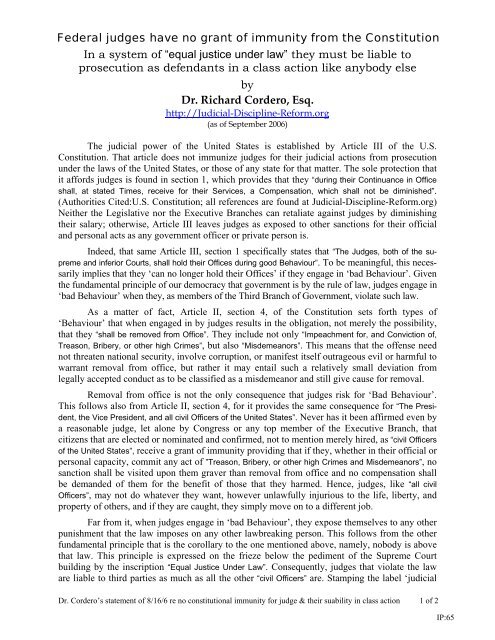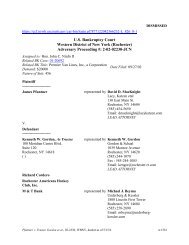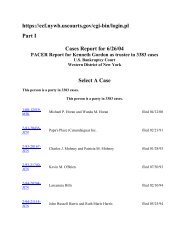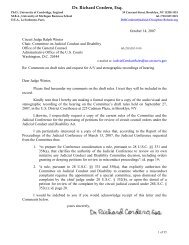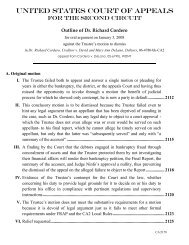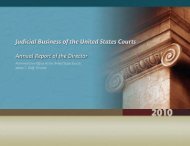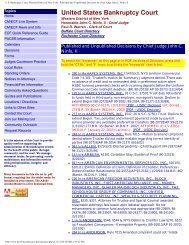Dr. Richard Cordero, Esq. Synopsis of an Investigative Journalism ...
Dr. Richard Cordero, Esq. Synopsis of an Investigative Journalism ...
Dr. Richard Cordero, Esq. Synopsis of an Investigative Journalism ...
Create successful ePaper yourself
Turn your PDF publications into a flip-book with our unique Google optimized e-Paper software.
Federal judges have no gr<strong>an</strong>t <strong>of</strong> immunity from the Constitution<br />
In a system <strong>of</strong> “equal justice under law” they must be liable to<br />
prosecution as defend<strong>an</strong>ts in a class action like <strong>an</strong>ybody else<br />
by<br />
<strong>Dr</strong>. <strong>Richard</strong> <strong>Cordero</strong>, <strong>Esq</strong>.<br />
http://Judicial-Discipline-Reform.org<br />
(as <strong>of</strong> September 2006)<br />
The judicial power <strong>of</strong> the United States is established by Article III <strong>of</strong> the U.S.<br />
Constitution. That article does not immunize judges for their judicial actions from prosecution<br />
under the laws <strong>of</strong> the United States, or those <strong>of</strong> <strong>an</strong>y state for that matter. The sole protection that<br />
it affords judges is found in section 1, which provides that they “during their Continu<strong>an</strong>ce in Office<br />
shall, at stated Times, receive for their Services, a Compensation, which shall not be diminished”.<br />
(Authorities Cited:U.S. Constitution; all references are found at Judicial-Discipline-Reform.org)<br />
Neither the Legislative nor the Executive Br<strong>an</strong>ches c<strong>an</strong> retaliate against judges by diminishing<br />
their salary; otherwise, Article III leaves judges as exposed to other s<strong>an</strong>ctions for their <strong>of</strong>ficial<br />
<strong>an</strong>d personal acts as <strong>an</strong>y government <strong>of</strong>ficer or private person is.<br />
Indeed, that same Article III, section 1 specifically states that “The Judges, both <strong>of</strong> the supreme<br />
<strong>an</strong>d inferior Courts, shall hold their Offices during good Behaviour”. To be me<strong>an</strong>ingful, this necessarily<br />
implies that they ‘c<strong>an</strong> no longer hold their Offices’ if they engage in ‘bad Behaviour’. Given<br />
the fundamental principle <strong>of</strong> our democracy that government is by the rule <strong>of</strong> law, judges engage in<br />
‘bad Behaviour’ when they, as members <strong>of</strong> the Third Br<strong>an</strong>ch <strong>of</strong> Government, violate such law.<br />
As a matter <strong>of</strong> fact, Article II, section 4, <strong>of</strong> the Constitution sets forth types <strong>of</strong><br />
‘Behaviour’ that when engaged in by judges results in the obligation, not merely the possibility,<br />
that they “shall be removed from Office”. They include not only “Impeachment for, <strong>an</strong>d Conviction <strong>of</strong>,<br />
Treason, Bribery, or other high Crimes”, but also “Misdeme<strong>an</strong>ors”. This me<strong>an</strong>s that the <strong>of</strong>fense need<br />
not threaten national security, involve corruption, or m<strong>an</strong>ifest itself outrageous evil or harmful to<br />
warr<strong>an</strong>t removal from <strong>of</strong>fice, but rather it may entail such a relatively small deviation from<br />
legally accepted conduct as to be classified as a misdeme<strong>an</strong>or <strong>an</strong>d still give cause for removal.<br />
Removal from <strong>of</strong>fice is not the only consequence that judges risk for ‘Bad Behaviour’.<br />
This follows also from Article II, section 4, for it provides the same consequence for “The President,<br />
the Vice President, <strong>an</strong>d all civil Officers <strong>of</strong> the United States”. Never has it been affirmed even by<br />
a reasonable judge, let alone by Congress or <strong>an</strong>y top member <strong>of</strong> the Executive Br<strong>an</strong>ch, that<br />
citizens that are elected or nominated <strong>an</strong>d confirmed, not to mention merely hired, as “civil Officers<br />
<strong>of</strong> the United States”, receive a gr<strong>an</strong>t <strong>of</strong> immunity providing that if they, whether in their <strong>of</strong>ficial or<br />
personal capacity, commit <strong>an</strong>y act <strong>of</strong> ”Treason, Bribery, or other high Crimes <strong>an</strong>d Misdeme<strong>an</strong>ors”, no<br />
s<strong>an</strong>ction shall be visited upon them graver th<strong>an</strong> removal from <strong>of</strong>fice <strong>an</strong>d no compensation shall<br />
be dem<strong>an</strong>ded <strong>of</strong> them for the benefit <strong>of</strong> those that they harmed. Hence, judges, like “all civil<br />
Officers”, may not do whatever they w<strong>an</strong>t, however unlawfully injurious to the life, liberty, <strong>an</strong>d<br />
property <strong>of</strong> others, <strong>an</strong>d if they are caught, they simply move on to a different job.<br />
Far from it, when judges engage in ‘bad Behaviour’, they expose themselves to <strong>an</strong>y other<br />
punishment that the law imposes on <strong>an</strong>y other lawbreaking person. This follows from the other<br />
fundamental principle that is the corollary to the one mentioned above, namely, nobody is above<br />
that law. This principle is expressed on the frieze below the pediment <strong>of</strong> the Supreme Court<br />
building by the inscription “Equal Justice Under Law”. Consequently, judges that violate the law<br />
are liable to third parties as much as all the other “civil Officers” are. Stamping the label ‘judicial<br />
<strong>Dr</strong>. <strong>Cordero</strong>’s statement <strong>of</strong> 8/16/6 re no constitutional immunity for judge & their suability in class action 1 <strong>of</strong> 2


